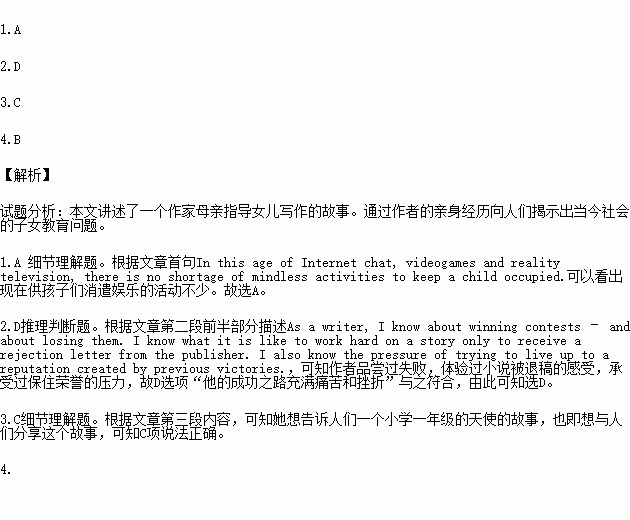题目内容
In this age of Internet chat, videogames and reality television, there is no shortage of mindless activities to keep a child occupied. Yet despite the competition, my 8-year-old daughter Rebecca wants to spend her leisure time writing short stories. She wants to enter one of her stories into a writing contest, a competition which she won last year.
As a writer, I know about winning contests – and about losing them. I know what it is like to work hard on a story only to receive a rejection letter from the publisher. I also know the pressure of trying to live up to a reputation created by previous victories. What if she doesn’t win the contest again? That’s the strange thing about being a parent. So many of our own past scars and destroyed hopes can resurface in our children.
A revelation (启示) came last week when I asked her, “Don’t you want to win again?” “No,” she replied, “I just want to tell the story of an angel going to first grade.”
I had just spent weeks correcting her stories as she spontaneously (自发地) told them. Telling myself that I was merely an experienced writer guiding the young writer across the hall, I offered suggestions for characters, conflicts and endings for her tales. The story about a fearful angel starting first grade was quickly “guided” by me into the tale of a little girl with a wild imagination taking her first music lesson. I had turned her contest into my contest without even realizing it.
Staying back and giving kids space to grow is not as easy as it looks. Because I know very little about farm animals who use tools or angels who go to first grade, I had to accept the fact that I was co-opting(借鉴) my daughter’s experience.
While stepping back was difficult for me, it was certainly a good first step that I will quickly follow with more steps, putting myself far enough away to give her room but close enough to help if asked. All the while I will be reminding myself that children need room to experience, grow and find their own voices.
1.What do we learn from the first paragraph?
A. A lot of amusements compete for children’s time nowadays.
B. Children have lots of fun doing mindless activities.
C. Rebecca is much too busy to enjoy her leisure time.
D. Rebecca draws on a lot of online materials for her writing.
2.What did the author say about her own writing experience?
A. She was constantly under pressure to write more.
B. Most of her stories had been rejected by publishers.
C. She did not quite live up to her reputation as a writer.
D. Her road to success was full of pain and frustrations.
3.Why did Rebecca want to enter this year’s writing contest?
A. She believed she possessed real talent for writing.
B. She was sure of winning with her mother’s help.
C. She wanted to share her stories with readers.
D. She had won a prize in the previous contest.
4.The underlined sentence probably means that the author was _______.
A. trying not to let her daughter enjoy her own life.
B. trying to get her daughter to do the thing as the author wished.
C. making sure that her daughter would win the contest.
D. helping her daughter develop real skills for writing.
 名师伴你成长课时同步学练测系列答案
名师伴你成长课时同步学练测系列答案

